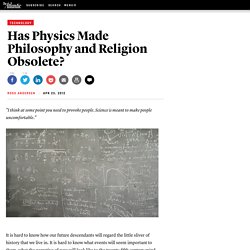

Washington and Lee University. The Consolation of Philosophy - Lawrence M. Krauss - Scientific American. A Universe from Nothing: Why There Is Something Rather than Nothing (9781451624458): Lawrence M. Krauss, Richard Dawkins. Philosophy v science: which can answer the big questions of life? Julian Baggini No one who has understood even a fraction of what science has told us about the universe can fail to be in awe of both the cosmos and of science.

When physics is compared with the humanities and social sciences, it is easy for the scientists to feel smug and the rest of us to feel somewhat envious. Philosophers in particular can suffer from lab-coat envy. If only our achievements were so clear and indisputable! How wonderful it would be to be free from the duty of constantly justifying the value of your discipline. Has Physics Made Philosophy and Religion Obsolete? - Technology. "I think at some point you need to provoke people.

Science is meant to make people uncomfortable. " It is hard to know how our future descendants will regard the little sliver of history that we live in. It is hard to know what events will seem important to them, what the narrative of now will look like to the twenty-fifth century mind. We tend to think of our time as one uniquely shaped by the advance of technology, but more and more I suspect that this will be remembered as an age of cosmology---as the moment when the human mind first internalized the cosmos that gave rise to it.
Over the past century, since the discovery that our universe is expanding, science has quietly begun to sketch the structure of the entire cosmos, extending its explanatory powers across a hundred billion galaxies, to the dawn of space and time itself.